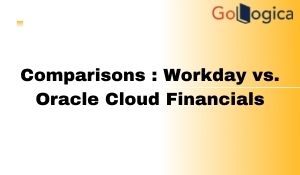
Objective:
In this article, we are going to give a complete difference between Workday and Oracle Cloud Financials. Let’s move right into our topic, Oracle Cloud Financials vs. Workday.

Introduction:
Many companies are forced to make the decisions of transformation regarding the infrastructure of back-office applications. The legacy software applications are required to be upgraded, and the on-premises customers are most likely starting to witness the benefits of moving to the solution of cloud-based software. Because of remote work, there is more pressure in managing an organization’s resources efficiently from a long distance.
We are often seeing the companies start to put very serious efforts into determining the best enterprise financial and accounting management solution which is able to meet the requirements of an organization. Various ERP systems and different vendors provide many drawbacks and benefits. Now, we will contrast and compare the two solutions, Workday and Oracle Cloud Financials (ERP Cloud), such that it’s easy for you to make a good and better decision regarding the solution of enterprise software that fits best in your company’s requirements.
Workday:
Workday provides a single system that can be used to support multidimensional reporting, financial transaction processing, planning, consolidation, and compliance while ensuring a consistent customer experience accessible from both mobile and desktop devices. The system of Workday Financial Management is built on the adaptive foundation that offers the companies the capabilities of financial management in a cloud-based application.
From the house’s financial side, Workday provides native payroll for Canada, America, France, and United Kingdom, having an option to connect to another payroll offering to manage the global payroll. The human resources professionals can use the dashboards that can show the payroll in groups and individuals to know the drill-down metrics and overview.
The Workday can utilize a schedule of weekly downtime from the maintenance perspective, with users experiencing more than 300 hours of downtime maintenance in a year. With these cloud-based solutions, the user will get benefits like quickly gaining a more accurate and complete picture of the company, also equipping the managers and executives with relevant and insights of contextual finance. By diving into your company’s unique requirements and assessing the tool that can make the most sense for your company could be a daunting task.
Oracle Cloud Financials (ERP Cloud):
The finance professionals can expect the latest back-office solution that offers everything in a single plant that can enable good decision-making, provide an intuitive customer interface, and make the daily workload very easy.
The Oracle Cloud Financials (ERP) provides a single stack to its customers, creating a secured and integrated solution that is vertically hosted on Oracle’s own servers. The Oracle ERP Cloud is the only solution on the present market for the users willing to have a single tenant and single stack and ERP solution/single-tenant application. It is built on the best applications of on-premise, but that can provide cloud convenience. Then, what is more, there is a certification for the cloud FEDRAMP that meets the security requirements of the American government.
With machine learning (ML) and artificial intelligence (AI) capabilities, the customers of Cloud Financials are able to see improved efficiency and usability while reducing the error via core process automation and offering the users’ guided actions. Being mobile responsive and all self-service, the Oracle ERP cloud customers can configure the notifications to send and receive push notifications, SMS text, and email approvals. The Oracle cloud includes the support of mobile with Stack and Microsoft Teams as well.
How do Oracle and Workday manage customer relationships?
One of the vital considerations for the users is the ease of doing the business with a vendor coupled with how the users feel all vendors are treating them over the relationship course and during the sales cycles.
In this area, Workday has been doing a tremendous job. Being a smaller and new player, it’s not a surprise, as many organizations in this stage of their growth are generally required to be customer-centric to survive and drive the growth. Workday has a dedicated sales team of the customer, and they can be readily wanting to bring in the executives in order to meet the users and address all the concerns and questions that they already have. Almost 98% of the customer satisfaction for Workday is referred to as a testament to the success in this particular area. Also, they do a great job on the commercial side, offering pricing transparency when demonstrating and requesting a very reasonable flexibility level while negotiating the commercial terms. Also, Workday has taken the proactive approach for offering frequently asked questions (FAQs) documents that can be used to accompany their MSA and offer information or data on some of the important terms.

When it comes to customer relationships, Oracle is notoriously very poor. The salespeople are often moved from one account to account and regular users tell us that the team that had sold the solution is not available to them in a year or two once the deal is closed or sometimes it is very short. So when a user has concerns and questions, they must begin from the initial stage to have a good relationship with the new team. Of course, the new team’s focus is on the new sales, but not on addressing concerns from the prior sale where they can’t earn the commission.
Annually, Oracle has raised the support fees to manufacture the opportunities of new sales, both of which have sourced perspectives of the customers of their Oracle relationship. Also, we have heard from several countries that they would prefer to move far away from the Oracle over time, citing the difficulty of the Oracle relationship in doing business with them as the main reason for the shift.
Workday vs. Oracle Product Performance:
Suppose a vendor has a good company vision; what does it matters most is if all the solutions perform as expected. The main part of this includes time, ease, and cost implementation of the solution. The users are satisfied with the solutions of the Workday from what we have observed already. Also, we have not heard of the major performance issues that can have few capabilities or the functionality that can be unavailable or not working properly. Workday’s 100% retention rates and 98% customer satisfaction demonstrate this. In addition, it can keep on adding the 500 clients of Fortune to the customer base along with several customers who are expanding the first Workday HCM solution footprint with planning, FI, Recruiting, Analytics, and so on. Also, Workday has focused on implementation cost reduction, and recently they announced more than 70% of the customers/users are in the production.
When it comes to Oracle, it has several challenges. Several customers expressed frustration over the difficulty level while implementing the solutions that can include raising the costs. Users have also complained about the functionality that is not working as promised, with the partial capabilities. It can also appear in the haste of Oracle to claim they have the complete offering of the cloud ERP. Also, they have not migrated to the on-premise functionality to the cloud solutions but can do in many waves over time. We can also believe that all these stem from Oracle becoming cobbling together several on-premise business application solutions they acquired over specific times.
Conclusion:
The above article gives you the complete differences between Workday and Oracle Cloud Financial. You can reach out to Gologica. Just call 82969 60414.
